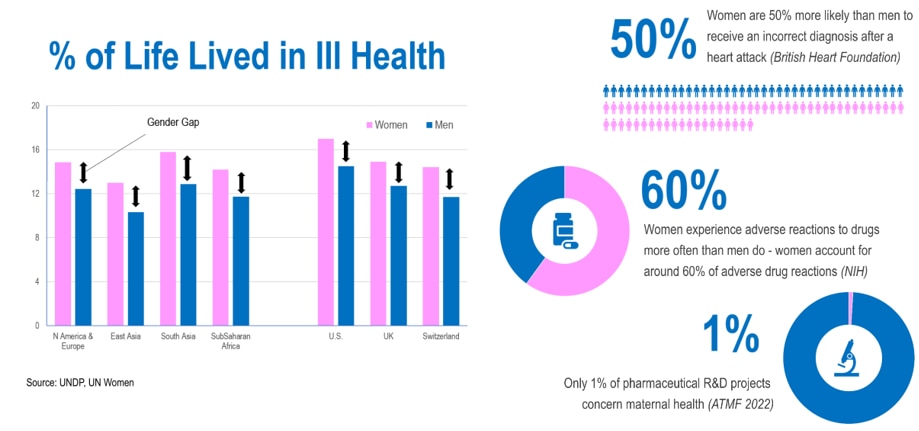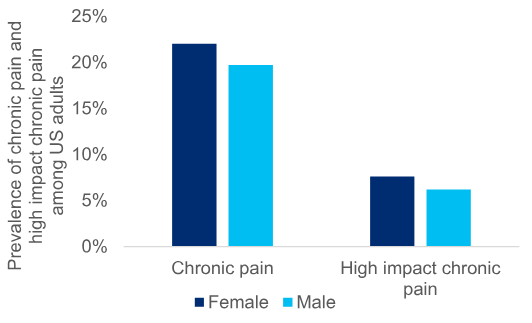
Healthcare serves women less well than men. Women live more of their life in poor health than men and they are also more likely to report a negative experience of accessing healthcare.
A recent report from Citi Global Insights explores the gender health gap, and the contribution that FemTech – which applies digital technology to address health conditions that impact women– can make to closing it.
FemTech and the Gender Health Gap

FemTech also aptly illustrates the way in which healthcare more broadly will evolve, as health, tech and consumer industries converge.
The report is timely because late last year, the U.S. Administration launched its first ever initiative on Women’s Health Research, noting the need to “fundamentally change how we approach and fund women’s health research.”
Healthcare innovation hasn’t worked well for women
It seems to us that a major reason why healthcare works less well for women is that both fundamental health research and the development of new drugs and devices has been stacked against women.
First, fundamental research into conditions that mainly affect women has been underfunded, relative to ones that mainly affect men.
Second, the financial incentives to develop drugs for women’s health are relatively weak. Only 1% of pharma R&D spending goes on maternal health.
Organon is the largest biopharma company that does focus on women’s health but it’s far smaller than the majors. When the company’s chief science officer was asked why so few other biopharma companies have a similar focus on women, he replied “It’s more [financially] interesting for companies to be active in other therapeutic areas such as oncology . . . investors are of course looking at the return on their investments.”
FemTech can help narrow the gender health gap
FemTech applies digital technology to help address women’s needs. The sector has grown significantly, with about $3.5 billion invested in start-ups in 2021 and 2022 combined. It represents a continuum from purely consumer products, like the period tracking app on the Apple Watch, through to FDA-approved healthcare devices.
Currently the main focus is on maternal and menstrual health, and fertility. We believe FemTech does help close the gender health gap. For example, some innovations in FemTech empower women in their interactions with the existing healthcare ecosystem by equipping them with quantifiable information about their bodies and knowledge about trends in their symptoms.
Early signs of change across healthcare
But FemTech can’t totally close the gender health gap by itself. It’s just too small. Last year about $1.5 billion was invested in FemTech startups, whereas $93 billion was invested in other healthcare startups. (Biopharma received about 46% of the total.) The good news is that we are beginning to see signs of change in the broader healthcare ecosystem: In the U.S., for example, the Biden Administration launched an initiative to boost women’s health research last month; in England a 10-year Women’s Health Strategy was launched last year.
The report points to three distinct aspects that are pushing the gender health gap.
1. Worse diagnosis - Women are often diagnosed late; they are more likely to be misdiagnosed in major conditions like heart attacks and strokes.
2. Worse therapeutics - For conditions that mainly or only affect women, there are often few available drugs. (The FDA has approved more than 1,200 drugs since 1985, but only five drugs for obstetrics conditions, for example.) In addition, women are more likely to experience side effects from drugs.
3. Worse pain management - Women are more likely to experience pain and less likely to receive pain relief.
Prevalence of chronic pain and high-impact chronic pain among adults by sex, United States 2021

Source: CDC (2023)
The report goes on to look at why traditional types of healthcare innovation don’t work well for women.
The report says that a major reason why women are less well served than men is that fundamental research and the development of drugs is stacked against them:
- Fundamental research into conditions that mainly affect women is underfunded, relative to ones that mainly affect men;
- The financial incentives to develop drugs for women’s health are relatively weak; and
- Clinical trials don’t work well for pregnant and lactating
Healthcare is still predominantly led by men. A study of the pharmaceutical industry in 2018 found that women fill just 25% of leadership positions and only one of the 10 largest pharmaceutical companies has a female CEO.
A lack of women leaders might shape the innovations that BioPharma focuses on, how seriously women are taken by healthcare providers, and the treatments that reimbursement systems will pay for.
The report also looks at the underfunding of fundamental research for women’s health.
There is good evidence that conditions that primarily affect women are not funded commensurate with their burden of disease.
The full report goes on to delve into how the financial incentives to develop drugs for women’s health are relatively weak in part because of the following:
Risk: The rules around drug discovery -- which are designed to make sure any new drug is both safe and effective and is tested ethically -- create incentives to focus on highly specific niche diseases, rather than on many of the problems affecting women.
Returns: Healthcare systems typically don’t reimburse payments for therapeutics for many of the most common female-only conditions, for example painful periods and around menopause
The report also contains an interview with Marcel van Duin, chief scientific officer at Organon and delves in more depth into some of the growing FemTech solutions that are available.
For more information on this subject, if you are a Velocity subscriber, please see the full report here Women’s Health - FemTech and the Gender Health Gap (15 Dec 23)
Citi Global Insights (CGI) is Citi’s premier non-independent thought leadership curation. It is not investment research; however, it may contain thematic content previously expressed in an Independent Research report. For the full CGI disclosure, click here.

